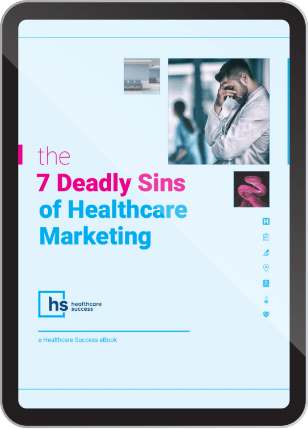[Podcast] How to Adjust Your Creative Strategies In Response to the COVID-19 Pandemic?
COVID-19 has been a life-changing event for us all. It's the kind of event that has lasting effects on people that we can't even truly see just yet. We've thrust an entire population into a cycle of grief that is ubiquitous but unique to every person. How will the healthcare consumer, patient, and caregivers' needs, wants, and actions change now and in the future?
Meanwhile, has your creative strategy, creative communications, and creative messaging kept up? Which changes should you make now?
In preparing for a recent webinar, I asked our former Creative Director, Dana, to share some of her ideas about COVID-era creative messaging.
In case you don't have time to listen to the recording, here is a synopsis of the most critical points we discussed. There is also a complete transcript of our discussion just below this synopsis:
Coronavirus and the stages of grief
The Elisabeth Kübler-Ross grief model helps explain how people deal with death and grief. It provides a useful context to understand the many ways people cope with extraordinarily difficult circumstances, such as their own impending death, the demise of a loved one, a financial crisis, or, as Dana suggests, the COVID-19 pandemic.
- Shock and Denial: We still have many people in this grief-phase, and some may never leave it. In the early days, the spring breakers were a perfect example of this behavior. Now that the country is reopening, others are resuming their lives with little to no thought about protecting themselves or others from the coronavirus.
- Anger: Yes, some people have moved on, but others are still right there. Many people vehemently protest masks, guidelines, and restrictions. Worse, misinformation and conspiracy theories are now polarizing the nation, thereby threatening public safety as well.
- Depression and Detachment: Many are still here, and won't be able to move on until some sense of normalcy is restored. These are the folks who've gotten more quiet and introspective over time. You've seen this in your family, your coworkers, even that used to be a super happy cashier at the grocery store.
- Dialogue & Bargaining: The vast majority of people are here and will stay here for quite some time. The good thing is they're talking, reaching out, learning, responding. We need to support them and help them make their way to acceptance.
- Acceptance: People are tip-toeing into this phase. These will be the resilient leaders who pave the way for others. Eventually, they will move on to "return to a meaningful life."
Rethink your archetypes
Rethinking your healthcare archetypes is critical right now. Before you do anything, think about how your patient population might have evolved for better or for worse in their thinking, or even jumped from one archetype to another. While everyone around you will feel the need to move fast, it's worth your time to reevaluate your audience before you push out messaging that might not resonate anymore.
Enter the new “COVID Resolutionists"
Many people are looking to respond to COVID-19 by taking this opportunity to make positive changes in their lives. Dana predicts that healthcare will be the highest priority on most people's lists.
What will the "COVID Resolutionists" need from the healthcare system and their healthcare providers that is new and different as the battle marches on? How do we promote, embrace, and facilitate all of those who are now more motivated to act on their health and wellness positively? How do we think about and protect those that might be internalizing toxic levels of stress?
- The people who were already obsessed with health and wellness are going to be even more obsessed. Wanting to "get ahead of the health game, they will move forward with or without our help.
- There is also going to be a large group of people who took their health for granted (did some things right, some things not so right) who will be seriously stepping up their game. They'll want to make sure they know whether or not they have any underlying conditions. Expect to see a rise in everything from colonoscopies to mammograms, skin cancer checks, etc. Expect lots of new questions from avid Googlers about diets, exercise plans, vitamins and supplements, proactive screenings, etc.
- The deniers with comorbidities will also have changed, at least a portion of them. Whether motivated by fear or the urging of their families, they're going to try and step up to the plate. They're going to be terrible at it, as they weren't successful before. They'll need encouragement as they begin to reach out. They'll also need real strategies and tactics to help them get going, and even more strategies and tactics to promote adherence. The rest of this group will likely take the "head in the sand" approach and keep on as they have. However, many of them may be internalizing real fears that will only exacerbate their existing conditions.
- The worriers - have never been more worried. Not only will they obsess about every symptom, but they will see the world more differently than others. It will be far more contextual for them. They'll need your reassurance. They, too, will be prone to toxic levels of stress that could negatively impact their mental and physical health. You'll need to listen to these folks very carefully and be ready to help them address mental health issues/needs.
Begin your new creative approach now
What does all of this mean? It means you can't just look at anyone on the surface and take their actions or behavior at face value. There is a huge danger right now that we misjudge consumer behavior as having moved beyond grief, when in fact, they haven't even started.
And what happens with any resurgence? It's a measure twice, cut once across your segments. Constant monitoring to facilitate evolutions in your reopening messaging is going to be critical.
Finally, if you’d like to explore how Dana, I, and the rest of our team could help you with your COVID-19 related marketing challenges, please let us know.









